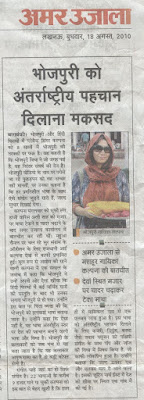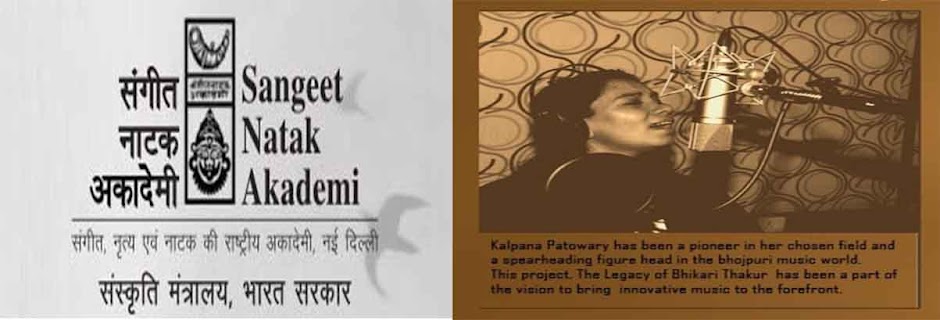

Singer Kalpana……They insulted me purely on the basis of their own opinion and not on facts.
Controversy was there right from the beginning –Gawanawa leija Rajaji…. One song which became an antheme –Ego chumma lela rajaji.Some said its was mere an expression of a loving wife,other said its not our culture,our bahu –beti will not express their feelings in such a bold way. While the whole nation was enjoying, some political manipulative industry persons couldn’t resist Kalpana as she was an outsider geographically. Yes, she is neither from UP or Bihar. Being from Assam how can she become sooo popular-this thought itself was a threat for many and their hatred was at its peak as we witnessed her effigy burning publically in BALLIA, UP. They insulted her purely on the basis of their own opinion and not on facts.
But nothing could stop her………as not many artists can take credit for being change-makers. You have to have courage and the belief in oneself to look beyond traditions and carve a unique niche for yourself.
Today BHOJPURI has given Kalpana so much that she can’t think of how to compensate back.Says Kalpana…..with god’s grace it’s been a very beautiful journey. Whenever people comes to know about me being from Assam they get surprised and always express-----oh Assam,Dr Bhupen Hazarika------Ganga Bahti ho kyon….and after him here comes Kalpana. I feel so very special because from my childhood days Dr Bhupen Hazarika has been my idol.And if my respected listeners thinks and put up my name just beside my childhood idol Dr Bhupen Hazarika,it itself carries so much of responsibility for me.
Says,Kalpana,I met so many singers all over the country who wants to become & sing like me. Yes they follow me as I am their idol…they sing and try to imitate me & my songs (devotional bhajans like devi geet,chhath geet,holi songs and even the filmi hot item numbers).I feel so very special but with that comes a very strong feel of responsibility to introduce them with real BHOJPURI music, about their musical roots, and to stand in this reigning global music scenario with their real identity.
But today, if we talk about Bhojpuri music, first we should know about Bhojpur, where it is …?
Three districts ARA, CHHAPRA from BIHAR and BALIA from U.P makes todays BHOJPUR and the boli or language spoken in Bhojpur is actually Bhojpuri.Its a different matter that now even avadhi,banarsi,maghai,angika and even to some extent maithli is also included as a part of Bhojpuri culture as people know it nationally.
But the core of Bhopuri boli is actually limited to only Ara, Chhapra and Balia.
Secondly, we have to know the authenticity of Bhojpuri music in its original and raw form to present to the world and to all those budding singers/artists.
The answer is off course- BHIKHARI THAKUR.
But then, who is he and where is he now?
Among the masses of Bihar and other Bhojpuri-speaking areas, he needs no introduction. But the so-called mainstream ‘culture’, like always, has conspired to keep mum about his contribution, actively avoiding, even mentioning his name and have fullstoped him with giving the title of THE SHAKESPERE OF BHOJPURI LITERATURE.
Hence, there are no serious documented accounts of his works till now. There are organizations who are also trying to revive HIM. But practically, none could bring out THE ARTISTE from the legend BHIKHARI THAKUR. Now here, I don’t want to take the credit, but yes I think it’s my turn to give something I can as an artiste.
I had to research a lot, now it’s been 3 year since. I had visited to many remote areas in Bihar to gather some knowledge about him. Then one fine day in a remote village called Bakhorapur in Ara,Bihar,I was introduced with a very sparkling moment of my life. I went for a cultural show.
Before my performance one artiste came and performed. His performance was so rustic,his voice, oh my god-I gulped.
He was a very aged person,may be 100 years old,known as a nartak in the original Bhikhari Thakur mandali.
I bowed and took ashirvaad from him and a desire took birth to sing Bhikhari in its original form.
Kalpana says-Bihar is not explored musically.Its always the U.P side the nation knows as Bhojpuri. Even in Bollywood it’s always the U.P folk.
I have heard many artiste singing Bidesia and in films also. It was good but somehow for me it was a polished version.
This old man had a completely different presentation.
Then I came back home to Mumbai, again got busy in professional commitments.
But that desire was still living inside me.
I tried to find BHIKHARI THAKUR on internet, failed, went to Patna searching books about him but in vain.
Then after a year, one local Patna artiste came with the ‘Bhikhari rachnawali’ by rashtrabhasha parishad,Bihar.
I was so happy and started studying the book about the inner facts of the whole social, political and spiritual elements of the Bhikhari time zone. But again one challenge raised, where to get the original thekas(rhythm)and original compositions as sung the way Bhikhari Thakur used to. A year later I went to Bakhorapur, met that rustic nartak and request him to sing for me.
He understood my intentions, agreed and the local villagers helped me to shoot and record the rustic nartak.
This desire to keep the legend alive and to introduce to the world the real Bhojpuri music, Bhikhari Thakur became my PASSION.This passion I am carrying is blissful and…I AM ENLIGHTENED………
